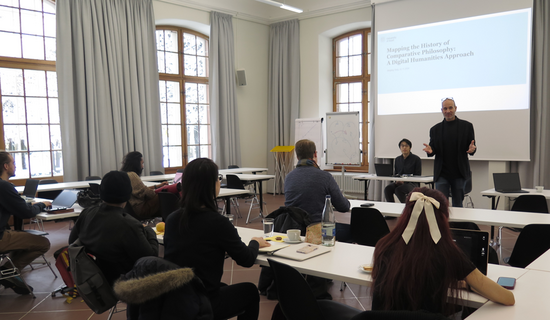/ News, Forschung, Studium, Doktorat, Weitere
Doctoral Colloquium PhD Project Lab (HS 24)



The Institute for European Global Studies has hosted another iteration of the PhD Project Lab. Doctoral students from the University of Heidelberg and the University of Basel had the opportunity to present their research projects to an interdisciplinary audience of doctoral and postdoctoral researchers as well as professors from the Institute. The event took place on 22 November.
In the opening presentation, Weiping Tang (University of Basel) introduced his dissertation project on «Mapping the History of Comparative Philosophy: A Digital Humanities Approach.» His research stands out for its innovative fusion of the complex inquiries of comparative philosophy with the advanced methodologies of digital humanities.
Matthias Stettler (University of Basel) presented his project titled «A Green Revolution avant la lettre? The case of chemical fertilizer» and discusses if chemical fertilizer represented an early precursor to the innovations associated with the Green Revolution.
Lars Dickmann (University of Heidelberg) presented his PhD project entitled «“Useful” and “Harmful” Parasites. Biological Insect Control in the Dutch East Indies (1925-1940)», which contains an analysis of conflicts between scientific institutions involved in debates about different methods, such as chemical or biological approaches, to control insects in ‘tropical’ colonies.
Following the small group discussions, Emmanuel Riem (University of Basel) presented a poster on «The Values Shaping Taiwanese – Chinese Bilateral Relations» and shared initial insights into his dissertation project. His research explores how the cultural and ideological values influence the decision-making between China and Taiwan, a conflict with the potential to shape the course of the 21st century.
The PhD Project Lab is a platform of the Graduate Program European Global Studies which enables exchange between early-career and senior researchers and enhances the interdisciplinary dialogue at the Institute. It specifically aims to transcend disciplinary boundaries and is designed to provide a stimulating environment for interdisciplinary research by adopting innovative forms of teaching.
It brings together doctoral and postdoctoral researchers as well as professors of the research areas Global History of Europe, European Global Knowledge Production and European Law from the Institute for European Global Studies, as well as PhD students from the University, who are attending the PhD Lab in the context of the Katekisama program.
The event was organized by Corey Ross and Ralph Weber, the leaders of the research areas Global History of Europe and European Global Knowledge Production respectively.



